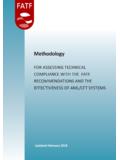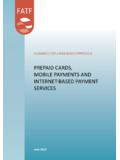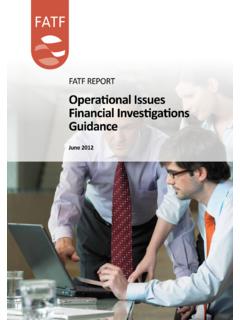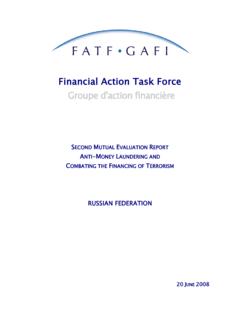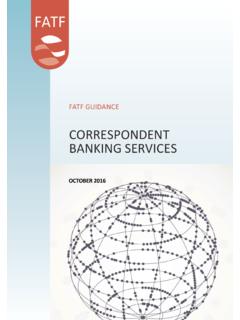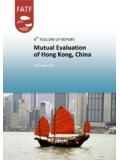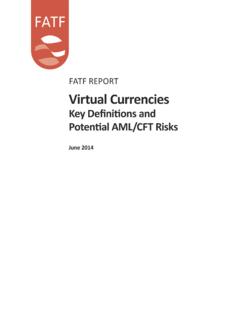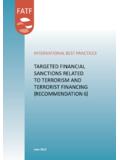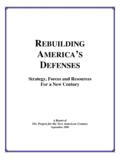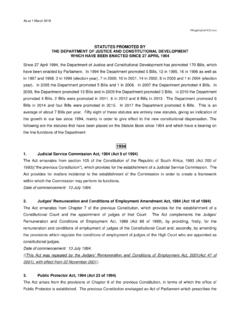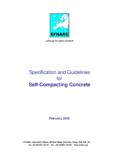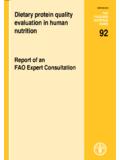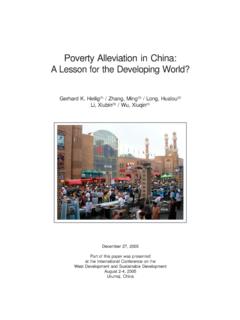Transcription of Financial Action Task Force Groupe d'action …
1 Financial Action Task Force Groupe d' Action financi re SUMMARY OF THE THIRD MUTUAL EVALUATION REPORT ON ANTI-MONEY LAUNDERING AND COMBATING THE FINANCING OF TERRORISM HONG KONG, CHINA 20 JUNE 2008 FATF/OECD 2008 All rights reserved. No reproduction, copy, transmission or translation of this publication may be made without written permission. Applications for permission to reproduce all or part of this publication should be made to: FATF Secretariat, OECD, 2 rue Andr Pascal 75775 Paris Cedex 16, France THIRD MUTUAL EVALUATION OF HONG KONG, CHINA EXECUTIVE SUMMARY 1. Background Information 1. This report provides a summary of the anti-money laundering (AML) and combating the financing of terrorism (CFT) measures in place in Hong Kong, China (hereinafter Hong Kong) at November 2007 (the date of the on-site visit) and immediately thereafter.
2 It describes and analyses those measures and provides recommendations on how certain aspects of the system could be strengthened. It also sets out Hong Kong s level of compliance with the Financial Action Task Force (FATF) 40+9 Recommendations (see attached table Ratings of Compliance with the FATF Recommendations). 2. Hong Kong is a special administrative region of the People s Republic of China (PRC). According to the design of the Basic Law, which is Hong Kong s constitutional document, the political structure is basically an executive-led system headed by a Chief Executive. Hong Kong also has a Legislative Council, the powers and functions of which include enacting, amending and repealing laws in accordance with the provisions of the Basic Law and legal procedures.
3 It is a common law legal system and the independence of the judiciary is enshrined in the Basic Law. Hong Kong is an international Financial centre with over 200 banking institutions and vibrant insurance and securities sectors. Authorities are not able at this time to determine the volume of money laundered in or through Hong Kong. The laundering of drug proceeds has declined in recent years and is increasingly derived from trafficking for domestic use. The primary domestic sources of laundered funds in Hong Kong are illegal gambling, fraud and Financial crime, loan sharking and vice. The availability of corporate services and the relative ease with which shell companies can be purchased contribute to the risk of Hong Kong being used for structuring of the proceeds of Financial crime, corruption, tax evasion and smuggling.
4 Investigations have found no evidence of terrorist funds moving through Hong Kong. 3. Hong Kong has a good legal structure to combat money laundering (ML) and terrorist financing (TF). The ML offence, established in 1989 and expanded in 1994, is broad and almost fully meets the FATF requirements. It is well prosecuted with a satisfactory conviction rate. The terrorist financing offence in the United Nations (Anti-Terrorism Measures) Ordinance is less expansive as it does not cover provision/collection for an individual terrorist or terrorist organisation. In addition, the offence applies to funds but not non- Financial assets and does not extend to terrorism directed towards international organisations.
5 Terrorist funds have not been detected in Hong Kong and there have been no prosecutions for TF. While Hong Kong has a workable and fairly comprehensive criminal confiscation regime, these measures are not available in all cases, do not extend to all predicate offences and the number of confiscations is relatively low. While legislative provisions have been enacted for confiscation of the proceeds of TF, these provisions are not yet in Force . Hong Kong s Financial intelligence unit is effective and is the focal point for Hong Kong s law enforcement efforts to combat ML and TF. It and other competent authorities have been designated responsibility for investigation and prosecution of ML and TF offences.
6 Measures for domestic and international co-operation are generally effective. 4. The preventive system addresses customer identification and other AML/CFT obligations and applies to a range of Financial institutions and some designated non- Financial businesses and professions (DNFBPs) as defined by the FATF. There are relatively limited requirements in place for remittance agents, money changers, money lenders (including those Financial factoring businesses which are not authorised institutions , banking institutions), credit unions, the post office and Financial leasing companies1. A number of the AML/CFT obligations exist only in mandatory guidelines issued by the regulatory authorities which are generally comprehensive and constitute other enforceable means.
7 The preventive system for some non-core Financial institutions does not incorporate adequate customer due diligence (CDD) requirements with respect to politically exposed persons. While the volume of suspicious transaction reports (STRs) has increased in recent years, the submission of STRs by DNFBPs could be improved. Sound requirements as to internal controls and compliance functions are in place for core Financial institutions (banking, securities and insurance). Supervision is effective for the banking, insurance and securities sectors, but weak or non-existent for many types of DNFBPs. The range of sanctions available for AML/CFT breaches is broad for core Financial institutions other than insurance and is appropriately employed by the supervisory authorities.
8 2. Legal System and Related Institutional Measures 5. The offence of ML related to drug trafficking was enacted in 1989 under the Drug Trafficking (Recovery of Proceeds) Ordinance and its application broadened by a complementary ML offence in the 1994 Organized and Serious Crimes Ordinance. The ML offence implements the elements of the Vienna and Palermo Conventions. Whilst predicate offences in Hong Kong generally cover a broad ambit of offences within each of the designated categories of offences, the range of environmental crimes that constitute predicate offences is limited. The offence of ML extends to any property that constitutes criminal proceeds, regardless of value, and a broad range of ancillary offences attaches to it.
9 The ML offence applies to natural and legal persons, though there have not been any prosecutions of legal persons for ML. The ML offence is well prosecuted with a satisfactory conviction rate. The maximum penalties available for ML offences are appropriately high. The sentencing starting point for more serious cases sits at four to six years imprisonment, in line with sentences passed for mid-tier frauds. 6. Terrorist financing was criminalised under the United Nations (Anti-Terrorism Measures) Ordinance (UNATMO) in 2002, however the offence is narrow in scope and certain key provisions of this ordinance are not yet in Force . Certain provisions within the United Nations Sanctions (Afghanistan) Regulation (UNSAR) also make it an offence to make funds or other Financial assets available to listed entities.
10 The TF offence under UNATMO does not cover provision/collection for an individual terrorist or terrorist organisation and the offence under UNSAR extends only to those individuals and entities designated by the 1267 Committee. The TF provision does not apply where the terrorism is directed at an international organisation or where the financing is in the form of assets other than funds . Its applicability is also subject to civil dissent exceptions of potentially broad reach. As noted above, Hong Kong has not, to date, brought any TF prosecutions. 7. Hong Kong has a workable and fairly comprehensive criminal forfeiture regime. Restraint and confiscation provisions are limited in their availability as they can be used only for those indictable offences listed in the Organized and Serious Crimes Ordinance (OSCO) and restraint may only occur where the amount involved is over HKD 100 000 (USD 12 800).

